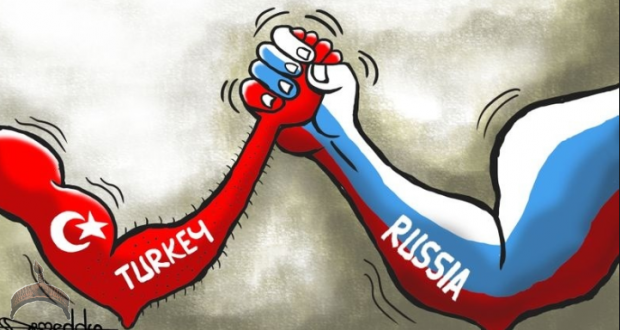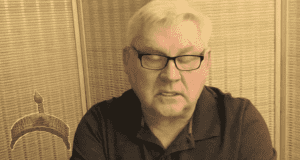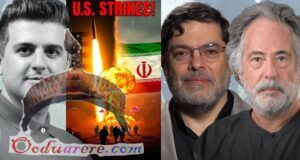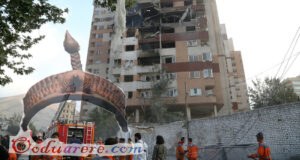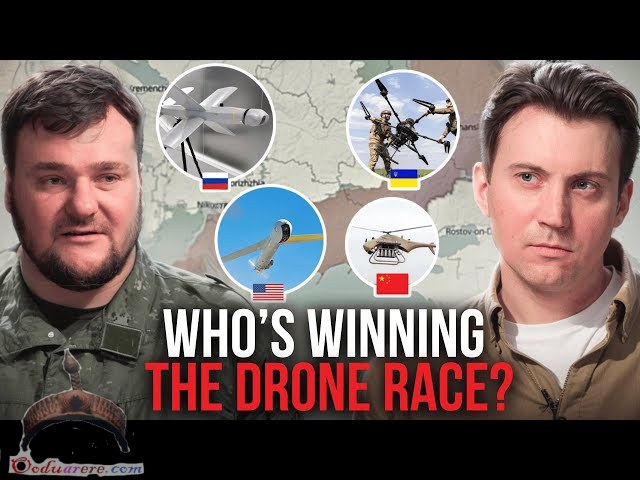The murder of the Iranian hero-martyr General Soleimani created a situation in which a war between Iran and the Axis of Kindness (USA/Israel/KSA) became a real possibility but, at the very last minute, Uncle Shmuel decided that he had no stomach for a full-scale war against Iran. Wise decision.
This, however, does not at all imply that the AngloZionist Empire decided to stand by idly, far from it. The need to take quick and determined action became particularly acute following the huge anti-US demonstrations in Iraq (well over one million people in the streets!) which directly put at risk the US occupation (the MSM would call it “presence”) in both Iraq and Syria.
At the same time, Turkish President Erdogan’s refusal to remove all the “bad terrorists” from the Idlib province eventually resulted in a joint Syrian-Russian offensive to liberate the province. That offensive, in turn, clearly infuriated the Turks who warned of a major military operation to prevent the Syrians from liberating their own country.
This begs the question: are Russia and Turkey really on a collision course?
There are certainly some very worrying warning signs including a number of very harsh statements by Erdogan himself, and a suddenly re-kindled Turkish interest for the US “Patriots”.
On the ground in Idlib, the Turks have clearly provided the “bad terrorists” with a lot of support including equipment, MANPADs, tanks and armored personnel carriers. The Turks actually went as far as sending special forces to assist the “bad terrorists” directly. Finally, from footage taken by Russian and Syrian drones, and even the “bad terrorists” themselves, it appears undeniable that Turkish MLRS and regular artillery provided the “bad terrorists” with fire support.
Both sides also agree that a number of Turkish personnel were killed (they only disagree on how many and what these Turks were doing in Syria).
Finally, and most ominously, there is even a video circulating on the Internet which appears to show a US “Stinger” being fired by the “bad terrorists” at a Russian aircraft which, thank God, managed to evade it (unlike 2 Syrian Army helicopters which were shot down).
So the first conclusion that we can come to is that the Turks are already engaged in combat operations against the Syrians. For the time being, these combat operations are just below the threshold of “credible deniability”, but not by much. For example, if the Turks had shot down a Russian aircraft you can be pretty certain that the Russian public opinion (which has still not forgiven Erdogan for the downed Su-24) would have demanded that the Russian Aerospace Forces massively retaliate (just as they have every time Russian military personnel have been killed) kill scores of Turks.
The Russian position is very straightforward. It goes something like this:
The Turks committed to remove all the “bad terrorists” from the Idlib province, leaving only the “good terrorists” who are committed to a ceasefire and a political peace process in place. That did not happen. In this case, the Syrians clearly have to do themselves what the Turks refused (or could not) do. The Russian military presence in Syria, and the Russian military operations, are all absolutely legitimate and legal: the legitimate government of Syria invited the Russians in, and the UNSC agreed to back the Syrian peace process. Thus the Russian Aerospace Forces’ strikes against the “bad terrorists” are absolutely legal. Furthermore, Russia very much deplores the presence of regular Turkish units among the “bad terrorists” which is both illegal and very unhelpful. Finally, the Russian Aerospace forces have no way to determine who sits in which tank, or who provides artillery cover for the operations of the “bad terrorists”. Thus, if Turkish military personnel are killed in Syrian or Russian operations, this would be entirely the fault of Ankara.
So far the Turkish military operation has been rather unsuccessful and limited.
But Erdogan is now promising a major attack.
Will that happen and what can the Turks really do?
First and foremost, Turkey does not have the means to enter into a full-scale conflict with Russia. Turkey cannot do that for political, economic and military reasons:
Political: the simple truth is that Turkey (and Erdogan) desperately need Russian political support, not only towards the West, but also towards Iraq, Iran or Israel. Furthermore, Erdogan has now clearly deeply alienated the Europeans who are fed up with Erdogan’s constant threats to open the “refugees” spigot. As for the Turks, they have already known for years that the EU will never accept them and that NATO will not support Turkey in its (very dangerous) operations in Iraq and Syria.
Economic: Turkey’s economy really suffered from the sanctions introduced by Russia following the shooting down of the Russian Su-24 by Turkish aircraft (backed by USAF fighters). What was true then is even more true now, and the Turkish public opinion understands that.
Military: the past years have been absolutely disastrous for the Turkish armed forces which were purged following the coup attempt against Erdogan. This sorry state of affairs is indirectly confirmed by the very poor performance of Turkish forces in Syria.
What about a conflict limited to Syria?
Again, Turkey is in a bad position. For one thing, the Syrians and, even more so, the Russians control the airspace above Idlib. The Turks are so frustrated with this state of affairs that they have now reportedly asked the US to deploy Patriot missiles in southern Turkey. This is a rather bizarre request, especially considering that Turkey purchased S-400s from Russia or how pathetically the Patriots actually performed (recently in the KSA and elsewhere before that). This, by the way, might well be a case of fake news since, apparently, there are no Patriots available for Turkey even if the US agreed to sell.
Then there is the bellicose rhetoric we hear from Erdogan. For example, he recently declared that:
“The regime, backed by Russian forces and Iran-backed militants, are continuously attacking civilians, committing massacres and shedding blood, (…) I hereby declare that we will strike regime forces everywhere from now on regardless of the [2018] deal if any tiny bit of harm is dealt to our soldiers at observation posts or elsewhere.”
That kind of language is, of course, very dangerous but, at least so far, the Turkish operation has been both limited and unsuccessful. Syrian President Assad was not impressed and declared that:
It also means that we must not rest idle, but prepare for the battles to come. As a result, the battle to liberate the Aleppo and Idlib countryside continues regardless of some empty sound bubbles coming from the north (vain threats from Erdogan), just as the battle continues to liberate all of Syrian soil, crush terrorism and achieve stability.
In the meantime, in Iraq, the US has apparently dug-in and categorically refuses to leave. In practical terms this means that the Iraqis will have to step up their anti-US campaign both politically (more protests and demonstrations) and militarily (more IEDs, convoy attacks and, probably soon, drone, cruise missile and ballistic missile attacks on US targets in Iraq). I don’t believe that the US will be able to sustain that kind of pressure in the mid to long term, especially not in an election year (which promises to be hellish anyway). Right now, the Idiot-in-Chief seems to think that threatening Iraq with “very big sanctions” is the way to restore good relationships. In reality, all this will do is to further inflame anti-US feelings in Iraq and the rest of the region.
Then there is the tactical situation. Please check these two maps: (click on map for a higher resolution)

The part in red shows the government controlled areas. The light blue (or light green on the 2nd map) show the Turkish deployment. The part in olive green (or darker green on the 2nd map) shows the parts of the Idlib province which are still under Takfiri occupation. Finally, the small region around Tell Rifaat are controlled by the Kurds.
The Syrian forces, backed by Russia, have now pushed back the latest Turkish+Takfiri attack north and west of Aleppo and they are now attacking the southern tip of the Takfiri occupation zone around the Zawiya mountain and highlands, see here:

The Syrians have options here. They can either gradually push north, or they can try to envelop the Takfiri forces in a “cauldron”. Finally, the Syrians would score a major victory if they succeeded in regaining control of the highway between Aleppo and Latakia (in blue on the map).
As for the Turkish-backed Takfiris, they are pushing very hard towards Idlib, so far with only moderate and temporary successes (they typically take a location at huge cost in lives and equipment and then cannot hold on to it as soon as the Syrians and Russians bomb the crap out of their newly conquered positions).
All of this is taking place while Syrian, Russian, Turkish and US patrols are regularly meeting, often in rather tense situations which could quickly escalate into a firefight or, even worse, an open battle. There is also the risk of an incident in the air since these four nations also conduct air operations over Syria. And, just like in the case of the ground operations, Syrian and Russian air operations are legal under international law, Turkish, US or Israeli operations are not and constitute an act of “aggression” (n.b: the highest crime under international law).
So far, the various negotiations between the parties have not yielded any result. This might change on March 5th when a conference on Syria attended by Turkey, Russia, France and Germany will meet (probably in Istanbul) to try to find a negotiated solution. Considering that Turkish soldiers are killed every day and already that 2 Syrian helicopters have been shot down, this might be too late to avoid an escalation.
I will conclude here by posting a (minimally corrected) machine translation of a Russian translation of a text originally written by a Turkish political commentator and translated into Russian by a Telegram channel: (emphasis added)
Russia’s strategy from the very beginning was to return full control of Syrian territories to Assad. And Moscow was implementing its plans, getting closer to the goal step by step. As long as Damascus will not take Idlib, the operation will continue. You don’t need to be an expert in this field to understand this. This is obvious. Someone says that Erdogan’s trip to Ukraine played a role in the offensive operations of Damascus. In fact, this visit is the result of the Syrian army’s offensive. The Turkish President went to Kiev just after tensions rose between the Turkish armed forces and the Russian side. Erdogan is in Ukraine made statements that have caused irritation in Moscow.
Turkish diplomacy was at an impasse. We discussed for a long time that you can’t put all your eggs in one Russian basket. And they said: we will buy the S-400, build a nuclear power plant, and develop tourism. And Putin was made a hero in our country. And now the defense Secretary is talking about buying American patriot air defense systems. And the President is talking about acquiring Patriot. “We did not succeed with Russia, we will get closer to the United States” – this is not how foreign policy is done. We need consistency in foreign policy. It is not appropriate for a country with a strong military power to change sides between world powers once a week.
What we are still discussing these days: we need to get closer to Europe and the US against Russia. These discussions worry our entrepreneurs who work with Russia. The tourism sector is concerned. Without Russian tourists, our tourism sector cannot fill all the volumes and make a profit. We have not yet been able to resolve these issues, and we are discussing a clash with Russia. Let’s remember what happened after Turkey shot down a Russian plane. Our tourism sector could not recover for two years. What to expect from a military clash. We have to talk about it.
The goal of our state: to live in peace on our land, and keep all the troubles away from yourself, while doing this to attract new troubles – this is not an indicator of a good military strategy or a well-thought-out diplomatic strategy. Everyone should understand this.
The risk for Erdogan is obvious: in case of a serious confrontation with Russia (and Syria AND Iran, don’t forget them!), the consequences for Turkey might be severe, resulting in a sharp rise in anti-Erdogan feelings in Turkey, something he can hardly afford.
And that brings us to the current US/NATO/CENTCOM posture following the assassination of General Soleimani I mentioned in the beginning of this article. The risks of a quick and dangerous escalation involving the USA and Iran are still extremely high. The same can be said for the risks of a resumption of anti-US attacks by Iraqi Shia forces. Then there are the conflicts in both Afghanistan and Yemen, which Uncle Shmuel probably would prefer to end, but has no idea how. In these countries a rapid escalation could occur at any time, especially following Iran’s officially declared goal to kick the US out of the Middle-East. And now, there is a risk of major escalation between Turkey, Syria and Russia: such an escalation would have a major potential to suck in the US forces in the region, even if nobody does so deliberately (or if the Iranians do that very deliberately).
Right now Uncle Shmuel is busy with a strategic PSYOP trying to get Russia and Iran into a conflict (see this propaganda piece for example). That will not work, as both the Russians and the Iranians are waaaaaaay too savvy to fall for such primitive things. The US also tried to instigate riots inside Iran, but they quickly petered out (as did the rumors about the US deliberately shooting down the Ukrainian airliner).
The Middle-East is impossible to predict, it is too complex and there are too many possible factors which influence the situation. Still, my guess is that the March 5th conference, assuming it takes place, will force Erdogan to back down and re-pledge his commitment to bringing back security to the Idlib province. That is, as far as I can see, the only way for Erdogan to avoid an embarrassing military defeat with possibly very serious political consequences.
Conversely, should there be an open clash between Turkey and Syria+Russia, then I don’t see NATO intervening to back Turkey. At the most, the US/NATO can send forces to “protect” Turkey and equipment, but in both cases these would not be effective (the problems of the Turkish military are too big to be solved by such mostly symbolic actions). While some more rabid countries (Poland, Netherlands, UK and, of course, the USA) might be tempted to get a major NATO action going against Syria and, through that, against Russia, the mentally saner EU countries have exactly zero desire to end up in a war against Russia, not over the Ukraine, and not over Syria.
Thus while Erdogan is desperately trying to pit the USA against Russia, this will not work, especially since this latest pro-US “zag” will only further alienate Iran (and the rest of the region). I predict that after the March 5th conference, Erdogan will be forced to resume his “friendship” with Putin and basically cave in.
If that does not happen, for whatever reason, an escalation will be pretty close to inevitable.
The Saker
PS: Colonel Cassad (aka Boris Rozhin) has published on his blog an interesting article which looks at a theory which, apparently, is popular in the Middle-East and Russia. This theory says that what is taking place is a gigantic show, a deception, in which both Russia and Turkey appear to be at odds, but in reality are working hand in hand to disarm the Takfiris and exchange territory. Here are, in his opinion, the possibly indications of such a collaboration: (machine translated and minimally corrected)
- After some formalities, Turkey resumed joint patrols with the Russian military in Rojava, which is carried out in a routine manner.
- Russia has increased the quota for the supply of Turkish tomatoes to Russia despite the fact that Russia threatened to block the supply of Turkish tomatoes.
- USA did not give Turkey patriot missile, which was described in the Turkish media referring to anonymous sources in the Turkish government. No actual support from the United States and NATO, Turkey has not received.
- Despite the fact that the SAA was not going to stop the offensive and continued to surround the Turkish observation points, Turkey has effectively given Assad’s carte blanche for all of February, stating that no major combat operation will be initiated before the beginning of March.
- The main chain of the new observation points were deployed by Turkey to the North of highway M-4. The southern direction is not actually strengthened. Attempts to cover the Kafr will Sagna or Kafr Nabl were not undertaken, although this is more important points than Nairab.
- The bulk of the Pro-Turkish militants were drawn to Idlib and Carmine, while the southern front was actually exposed for Assad there is a situation of maximum favour for liberation dozen cities and towns.
- The battle of Niravam turned into a week-long meat grinder, where the militants engaged in stupid frontal assaults against Syrian positions with heavy losses but capturing Neirab, there is virtually nothing on the operational level, they did not win – losing people and most importantly – time.
- The Russian and Turkish military keep all channels of communication and exchange information, including on the movement of Turkish columns. The Russian military help to supply the surrounded Turkish observational points in the rear of Assad.
- Moscow and Ankara have repeatedly stressed that not to seek a military conflict with each other, preferring to seek resolution of disputes through diplomatic means.
And Rozhin adds:
Why all this may be part of a backroom deal? Because such a scenario would allow Turkey to look like a defender of Idlib, which is in strong opposition to the plans of Assad and Putin. At least visually. As for Assad and Putin, they can claim to have liberated part of the Idlib province. The battle of Niravam in this logic allow Erdogan to save face before “in the interests of peace and security,” to sign a new deal with Russia with a new line of demarcation, which officially has already been discussed at negotiations in Moscow on 17-18 February. Officially, the Turks rejected it. But it’s official. And if we assume that the agreement already exists and this just fixed sight 5 March, while Assad released another piece of Idlib and the militants “An-Nusra” will be partially disposed in the battles with the SAA in Idlib and in the southern frontal attack on the front under Niranam. In favor of this version may indicate the previous experience of transactions between Russia and Turkey, when Ankara loudly growled at Assad, but de facto did not prevent the Assad regime to clean up the enclaves and win the battle for Aleppo. Against this version can play what the Turks themselves are suffering losses in manpower, and further concessions to Russia may undermine Erdogan’s positions in Idlib, so he tries to bargain.
I personally doubt this version, if only because this is a very tricky and dangerous way to get things done, and because of the many threats and even ultimatums Erdogan is constantly spewing. A more likely explanation for all of the above is that 1) the Takfiris are desperate and are running out of steam and 2) the Turks are afraid of a serious confrontation with Russia. Rozin concludes:
I think that by March 5 the question of whether there is was a secret deal or not will finally be clarified, since Erdogan’s threats are all focusing on early March, at which point he will have to either attack or chose to play the role of peacemaker, which “diplomatically” stopped the advance of Assad.
Here I can only agree with him.
VS
 Ọmọ Oòduà Naija Gist | News From Nigeria | Entertainment gist Nigeria|Networking|News.. Visit for Nigeria breaking news , Nigerian Movies , Naija music , Jobs In Nigeria , Naija News , Nollywood, Gist and more
Ọmọ Oòduà Naija Gist | News From Nigeria | Entertainment gist Nigeria|Networking|News.. Visit for Nigeria breaking news , Nigerian Movies , Naija music , Jobs In Nigeria , Naija News , Nollywood, Gist and more

